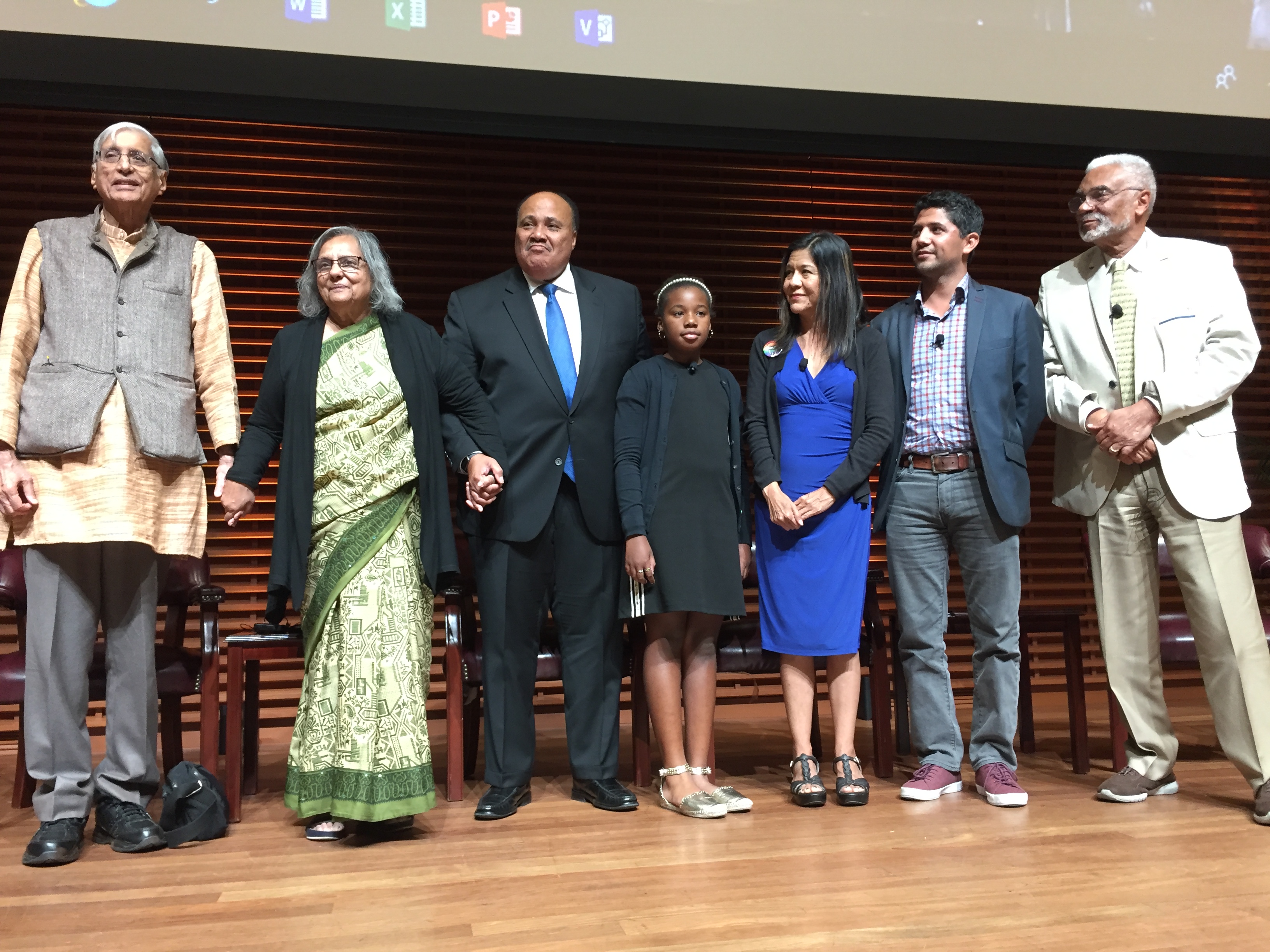Hundreds gathered at CEMEX auditorium for the opening symposium of the inaugural Gandhi-King Global Initiative (GKGI) Conference on Friday. The event brought together the families of historic nonviolent changemakers Mahatma Gandhi, Martin Luther King Jr. and Cesar Chavez, as well as prominent scholars, figures and honored guests, including Sister Helen Prejean and James Lawson.
The conference, which commemorates the 150th anniversary of Gandhi’s birth, consisted of a three-day series of lectures and events across campus aimed at evaluating Gandhi, King Jr. and Chavez’s legacies in a modern context and sparking a larger discussion about human rights issues and inequities that still exist today. Their descendants took the lead on Friday, opening the weekend and presenting their perspectives and stories in a panel format.
One of the messages all the panelists echoed was the power of every individual to make the world a better place.
“We are all ‘wonder people’ and we all have the ability to make change,” said Juanita Chavez, daughter of Dolores Huerta, co-founder of the National Farmworkers Association.
Rajmohan Gandhi, Mahatma Gandhi’s grandson, stressed that the capacity to make change is not limited to a select few.
“Some of us may have the blood, but all of us have the spirit,” Rajmohan Gandhi said. “All of us have got to know one another deeply, embrace the story, embrace the lives. Once we get to know each other, the U.S. and the world will see the difference.”
Martin Luther King III, son of Martin Luther King Jr., echoed the idea of grassroots action: “We have the ability to reason, but we have allowed society to program us. We are not thinking, we are being programmed. Non-violence allows us to go to a higher level … Compliments, dignity, respect, that is what non-violence teaches us.”
Panelists also praised the power of youth to bring about societal change. Juanita and Anthony Chavez (grandson of Cesar Chavez) commended the youth for their ability to think critically and question authority, and Ela Gandhi (granddaughter of Mahatma Gandhi) discussed her own demonstrations as a young adult in South Africa.
Yolanda Renee King, the 11-year-old granddaughter of King Jr, has taken an active role to reduce gun violence and mitigate the effects of climate change.
“My grandfather had a dream that people would not be judged by the color of their skin, but by the content of their character,” Yolanda Renee King said. “I also have a dream. My dream is for a gun-free world.”
Jayaram Komati, an Indian businessman and diplomat who helped convene for the conference, called for peace and nonviolence in the world today and he said he hopes this conference will raise awareness among the future generations of Gandhi and King’s legacy.
Fremont Mayor Lily Mei also attended the Gandhi-King conference.
“I’m excited to have a chance to hear about how we are able to work with another to come to peaceful resolutions,” Mei told The Daily. “If you look at some of the rhetoric that’s happening at the national level, we realize we need to figure out the commonalities so that we can come to terms of how we work with one another and serve each other.”
Aside from discussing steps we can take to make the world a better place, each of the descendants also shared personal stories about their interactions with their respective family members.
Lakiba Pittman, a professor at Menlo College, said she enjoyed listening to all of these perspectives.
“Each speaker gave me something different, deeper,” Pittman told The Daily. “I was very inspired and confirmed the work I’m doing to open the hearts and minds of my student. And get them to recognize that they have power, they can make a difference. Each had their own dynamic that went straight to your soul, which I like. It’s what we need now.”
Clayborne Carson, history professor and founding director of Stanford’s Martin Luther King, Jr., Research and Education Institute, who also served as the conference director and moderated the opening panel, said he thought the event “went wonderfully.”
“I feel that the six months of work was worth it,” he added.
He worried about the idea of students missing the event.
“I don’t think there will ever be another event in which you bring together this group of people,” he said. “So, for the Stanford students who missed it, they missed a historic opportunity.”
Registration for the conference was $150, but Stanford students and Stanford affiliates could register for free. Panels and presentations included “Nonviolence in Action – Promoting Peace and Nonviolence in Los Angeles” and “Protecting Democracy.”
According to its website, the Gandhi-King Global Initiative (GKGI) is aimed at advancing the nonviolent struggle for human rights by assembling an international network of nonprofits and activist organizations hoping to emulate the collaborative model of Gandhi and King’s social movements.
Contact Ujwal Srivastava at ujwal ‘at’ stanford.edu.
